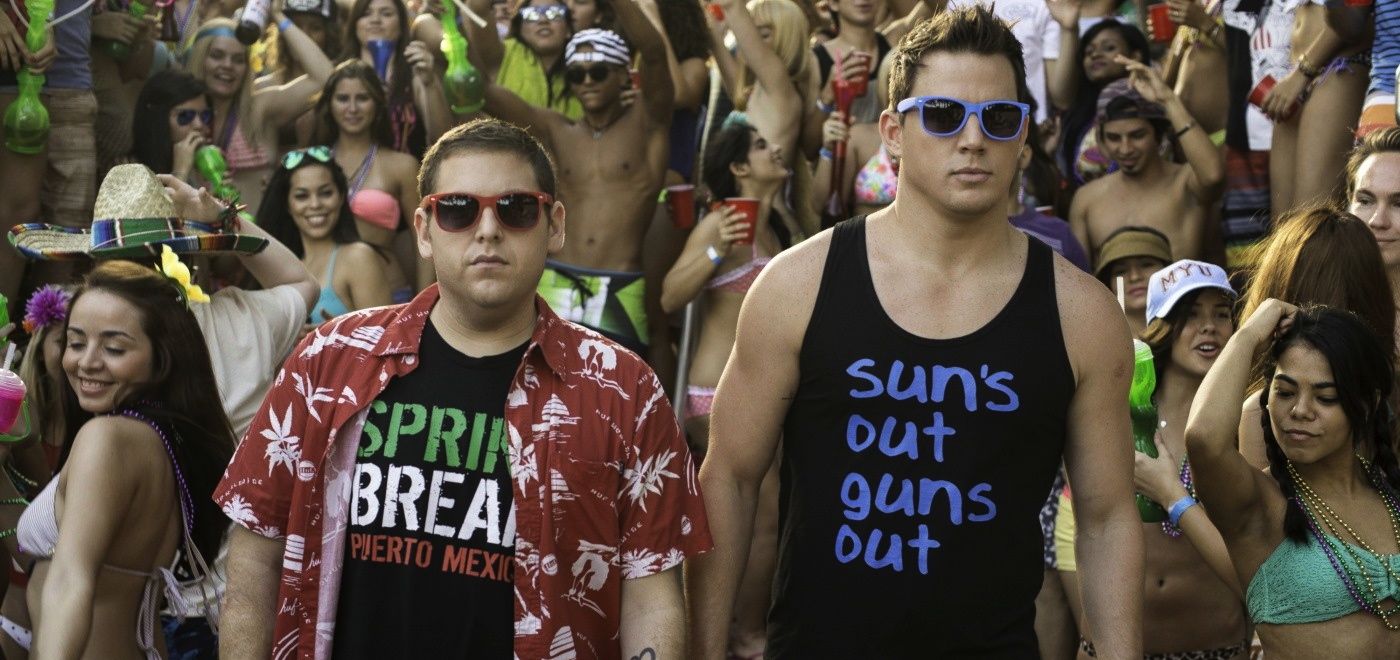
Odd couple Jonah Hill and Channing Tatum are undercover cops sent to a school to uncover a drug connection – stop me if you’ve heard this one before. 22 Jump Street on the other hand will not stop but rather bash you over the head with the fact that you’ve seen this film before, in what is one of the most enjoyably self-deprecating and self-aware comedies of the last few years without reverting to alienating or exasperating audiences. It’s a tremendously enjoyable and mostly clever film, with a central partnership with enough chemistry to carry the film over its less inspired stretches.
I was one of the many people who enjoyed 21 Jump Street far more than I felt I should have, and 22 Jump Street is even still a pleasant surprise, and as every reviewer and their mother have noted, wears its status as a cynical sequel on its sleeve. The production of the film is continually made analogous to the sting operation detectives Schmidt (Jonah Hill) and Jenko (Channing Tatum) undertake, as we are continually reminded that it has to be ‘exactly the same’ as last time, and are told to not go over budget, etc. It’s continually amusing, poking fun at not only the risk-averse studios that bankroll these sorts of franchise entries and the stars that sign on to them, but also at the audience that keeps handing over money to go and see them. It’s not hard to imagine there were some jokes about this film’s extraordinary advertising budget that were in the first drafts as well.
The meta jokes of the film don’t stop there either, with continual references to a host of other films (which I won’t reveal as they’re a lot of fun) visually and verbally, and it’s a film that has a lot of meta casting of actors, which like the first film really brings out the baggage or preconceived notions of these actors to flesh out some otherwise underwritten roles – Tatum interestingly now hasn’t been given a romantic interest in either film, perhaps trying to distance him from the Nicholas Sparks calibre dramas that people still stigmatise him for, but also in smaller parts; Parks and Recreation’s Nick Offerman’s lazy civil servant clearly plays off his internet fame as Ron Swanson and Ice Cube flourishes as police, when in a previous generation he was most known for singing about fucking them.1
As comedy it’s really great fun, with Tatum and Hill’s chemistry being the spark plug that really made this into a franchise, and somehow made the buddy cop genre feel new. They’re dynamite on screen together, and an awkward revelation for one of their characters mid-film makes for probably the funniest scene you’ll see in a cinema all year. However, they occasionally milk their chemistry and bromance for more than its worth, and the couple scenes where they talk about their partnership with intentionally cliché romance lines and play off the multiple meanings of ‘partners’ are jokes we’ve heard a hundred times before, and feel taken from inferior movies. But for most of the film it’s played just right, with Hill’s shtick fitting perfectly with the material, and Tatum continuing to be a revelation as a comic actor.One of the only true disappointments for me in the film is that for all the inside jokes about the film industry, the premise itself – of fitting in at college – isn’t really that explored. The concept of college is so ripe for satire that it’s hard to not feel that filmmakers of the intelligence of Lord and Miller miss a great opportunity. There are some attempts early on at satire – aggressively sexual slam poetry, Patton Oswalt as an overly liberal and inspirational lecturer – but these kind of miss the mark and are given up on and so a scene where Hill’s Schmidt hangs out with Art majors drinking wine in a studio doesn’t play as a fun take-off of college pretensions but merely a setting of the scene, and the frat parties seem like a flat reproduction of college movies from the 1980s. There’s such an American fascination and national narrative around going to college that may be too sacred for even comedy filmmakers to truly poke fun at. Furthermore the finale which occurs during Spring Break has no interest in skewering the iconic, idiotic festivities that take place, but merely acts as a backdrop to a separate meta joke of the production costs of the film ballooning to outrageous lengths.
22 Jump Street comes with a particularly interesting set of expectations – a sequel to a film that no one imagined they’d enjoy as much as they did, from directors Phil Lord and Christopher Miller, whose career on paper seems to be some weird series of dares trying to find the most horrible and ill-conceived Z-list screenplays and pitches – their credits now have two films that are reboots of a television series that no-one had that much particular affinity or nostalgia towards, a movie about Lego figurines and whatever the hell Cloudy With A Chance of Meatballs is supposed to mean as a sentence or film title. And yet, like a culturally omnivorous pair of King Midases, somehow they keep turning out gold, not just as talented craftsman but as artists, with their brand of humour coming out in each vastly different project. 22 Jump Street isn’t perfect, but it’s a really good entry in the franchise that despite all the jokes about further sequels, I hope isn’t finished – it’s a clever, funny film that will likely be the most fun you could have in the movies all year.
Around the Staff:
| Virat Nehru | |
| Felix Hubble | |
| Dominic Ellis | |
| Dominic Barlow | |
| Conor Bateman |
